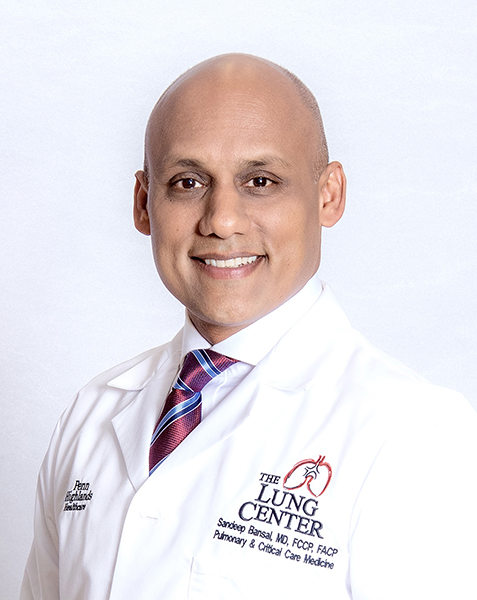Breathe Easy: Pulmonary Wellness on World Lung Cancer Day
This year’s World Lung Cancer Day on Saturday, August 1 comes with new perspectives in a time when COVID-19 has brought respiratory health into sharp focus. Dr. Sandeep Bansal, MD, Medical Director of The Lung Center and Intensive Care at Penn Highlands Healthcare, discusses how both the pandemic and World Lung Cancer Day create an opportunity to examine what lung health means in 2020.
To start, it’s worthwhile to remind readers that the prevalence of respiratory diseases are more prominent in our region than the national average, due to rates of smoking and environmental factors like radon. Bansal explains that while COVID-19 has inspired many folks to closely monitor how well they feel, for some others, the disruption in routine has actually led to less healthy choices. “The smoking rate has gone up,” Bansal says, attributing this to the recent socioeconomic changes.
The next natural question, of course, is whether this increased smoking trend will translate into an increased incidence of lung cancer. Bansal states that at this stage, it’s difficult to project. However, based on his expertise, Bansal offers some prediction: “Nationally, I think it will make an impact. Locally, it’s too soon to say.”
In December 2014, Bansal and Penn Highlands Nurse Navigator Candy Cole, RN, BSN, OCN, MPM, introduced a lung cancer screening program with an outreach to surrounding communities to ensure that lung cancer screenings are accessible to everyone. With respect to the COVID-19 pandemic, for a period of weeks they were forced to pause the screening service, which is now back in full service. The Penn Highlands Lung Center screening program “truly still is one of the most successful programs in the country,” Bansal says. In order to better suit the ongoing growth of the Lung Center and the screening program, recently the team has added two additional Nurse Navigators, Jordan Forcey and Jordan Troxell, who are working hard to reach patients who may need support to identify lung cancer in the early stages.
For anyone who feels that they could benefit from a lung cancer screening, Bansal suggests calling the Lung Center. “All they need to do is call us, and one of the nurse navigators will return their call within 24 hours.” For convenience, that number is 814-375-3770.
Other recommendations? “Number one, stop smoking—or better yet, don’t start it,” Bansal states. “And be conscious of the symptoms of respiratory disease, such as increased shortness of breath, wheezing, or coughing up blood.” The benefit of vigilance with symptoms like this is significant: “If you can diagnose it early, that means you can potentially cure it,” Bansal says.
Other tips he encourages us to mind are to eat a balanced, healthy diet with the appropriate amount of protein, vitamins, and exercise—ideally a 30-minute walk each day to start, and then if possible, build on that depending on your capability.
For patients who do need lung cancer care, Bansal shares a few of the services the lung experts at Penn Highlands offer. “Diagnostics-wise, one of the new developments is the robotic bronchoscopy, which helps us reach in the periphery in deepest part of the lungs with accuracy and safety. We’re still the only ones with that technology in the region.” He mentions that at Penn Highlands, over 100 patients have benefited from the robotic bronchoscopy so far.
For the patient who needs lung cancer intervention, Bansal says, “Our Thoracic surgery team along with our radiation oncology offer a robust, world-class service. Our oncologists are always staying ahead of the curve in terms of the newer therapies. Most notably would be the targeted molecular therapies,” he says. “These are based on certain gene mutations and targeting those mutations with drugs that have fewer side effects—and better survival.”
Learn more about lung services at Penn Highlands Healthcare by visiting http://www.phhealthcare.org/lungcenter/.

